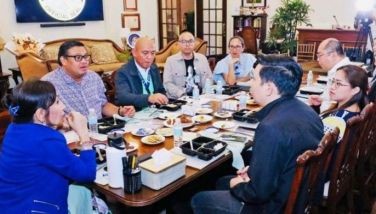Court rules athlete can play in CESAFI
CEBU, Philippines - Scott Aying of the University of San Carlos Baby Warriors should be allowed to play in their remaining games of the 2013 Junior Basketball League.
Regional Trial Court Judge Simeon Dumdum, Jr. of Branch 7 ordered last Monday that a writ of preliminary injunction will be issued after Aying can post a bond of P100,000.
The preliminary injunction will enjoin the Cebu School Athletic Foundation Inc. from implementing the two-year residency rule.
In his five-page order, Dumdum said he found sufficient evidence that there is a right for the junior athlete to be protected.
"After a rigorous review of the issue, the court finds that the petitioner has a right to be protected - the right to play in the 2013-14 CESAFI Basketball Season, and so directs that, upon the posting of a bond in the amount of P100,000, a writ of preliminary injunction issue against the respondents who, by themselves or their agents, are not to do or omit any act which would disqualify Aying or prevent him from playing in the 2013-14 CESAFI Basketball Season," he ruled.
Last Sept. 18, 2013, Dumdum issued a temporary restraining order against the CESAFI and its officials directing them to allow Aying to play in the game between the USC Baby Warriors versus the Cebu Eastern College Dragons.
However, on September 19, during its board meeting headed by CESAFI Commissioner Felix O. Tiukinhoy, Jr., the CESAFI board decided to postpone the remaining games of the 2013 Junior Basketball League until further notice.
With the recent development, Tiukinhoy told The FREEMAN that he has yet to talk with their legal counsel for their next move and will hold a meeting with the board.
Last Sept. 26, 2013 during an oral argument, CESAFI's lawyer Baldomero Estenzo asked the court to reconsider the TRO.
Aying, represented by his parents, lodged a civil case for injunction with TRO and damages against the CESAFI and its officials over his disqualification to play the 2013 Junior Basketball League. He said through his legal counsel Donato Gonzales that the two-year residency rule only applies to college student and not to him.
However, in an open court, Estenzo said that the disqualification of Aying has basis after he failed to meet the two-year residency requirement. This order, he added, attained finality when the board upheld the said decision.
Order
Dumdum clarified that the contentions of the respondents only applies to college student and not to high school based on the provision of the Amended Rules and Regulations for CESAFI 2012-2013 Tournaments, under the heading 'Eligibility/Qualifications of High School Students Athletes'.
"The provision-Section B.5-states: Transferees - Any high school student athlete of a CESAFI member school who transfers to another member school shall be required a minimum of two-year residence to qualify to play. The period of his residency shall be counted as part of his/her playing years. However, any student athlete from a disbanded member school team shall be eligible to play without the required residency," the order reads.
Dumdum said based on the complaint, Aying was enrolled at Don Bosco Technological Center in the school year 2011-2012, a CESAFI member school. However, in 2012-2013, he was enrolled at San Beda College, a non-CESAFI member school. Then he returned to Cebu and enrolled at the University of San Carlos, a CESAFI member school in the school year 2013-2014.
Aying was included in the lineup of players in the basketball team of USC-Basic Education Department.
However, before the opening of the league, the CESAFI screening committee disqualified Aying from playing citing Section B.5 of the Amended Rules and Regulations for CESAFI 2012-2013 Tournaments.
With the foregoing evidences, Dumdum said it was clear that Aying did not violate the rule.
"It is clear that Aying did not transfer from a CESAFI member school, San Beda College, the school in which he enrolled immediately preceding his transfer to the USC. San Beda College is not a CESAFI member school. The CESAFI Screening Committee erred in their interpretation of Section B.5."
He added that the section plainly states that "any high school student athlete of a CESAFI member school who transfers to another member school shall be required a minimum of two-year residence to qualify to play."
Jurisdiction
With the contention of the respondents that judiciary should not interfere with sports, Dumdum said "this might hold water in a perfect world." He said if the controversies involved rights of a person then the court has the "power to settle the same."
Aside from the CESAFI and Tiukinhoy, other named respondents were CESAFI president Fr. Manny Uy and the screening committee members Jess Himotas and Danny Duran. — (FREEMAN)
- Latest
- Trending


















